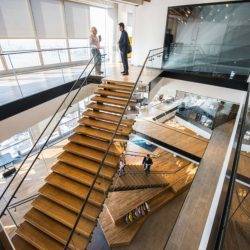February 7, 2017
Employers urged to create age friendly workplaces to help retain older workers 0

Employers should provide full and equal access to flexible working arrangements, occupational health support and appropriate workplace adaptations to help older workers to manage health conditions at work. This is according to a new report from the Centre for Ageing Better, Fulfilling work: what do older workers value about work and why? which identifies the characteristics of work that are important to people aged 50 and over, and explores actions employers can take to attract and retain them. Understanding what older workers want is the first step in helping employers, policy makers and others create age-friendly workplaces. By 2020, one in three workers will be over 50 but while the employment rate for all working age adults remains at a record high of nearly 75%, for people over 60, this falls to around 50%. and there are currently 12 million people heading towards an insufficient retirement income. Ageing Better commissioned the Institute of Employment Studies to carry out the study as to ways of helping people stay at work and the report finds that health is the most important factor affecting older workers’ decisions to continue in work, ahead of job satisfaction and job quality.


















 Amos Tversky and Daniel Kahneman introduced the concept of Loss Aversion in 1984, highlighting people’s tendency to strongly prefer avoiding losses to acquiring gains. Most studies suggest that losses are twice as powerful, psychologically, as gains. Lose £100 and we will feel a remorse that easily outweighs winning £100. In a similar fashion we find it very hard to see future positives when confronted with short term loses. We understand easily what we have lost but cannot imagine what there is to be gained. Furthermore, as Frederic Bastiat wrote in an 1850 paper, “That Which is Seen, and That Which is Not Seen”, man has a tendency to “pursue a small present good, which will be followed by a great evil to come, rather than a great good to come, at the risk of a small present evil”. Put these together and it is no wonder that, by and large, the future of work, corporate real estate and the workplace is so widely misunderstood.
Amos Tversky and Daniel Kahneman introduced the concept of Loss Aversion in 1984, highlighting people’s tendency to strongly prefer avoiding losses to acquiring gains. Most studies suggest that losses are twice as powerful, psychologically, as gains. Lose £100 and we will feel a remorse that easily outweighs winning £100. In a similar fashion we find it very hard to see future positives when confronted with short term loses. We understand easily what we have lost but cannot imagine what there is to be gained. Furthermore, as Frederic Bastiat wrote in an 1850 paper, “That Which is Seen, and That Which is Not Seen”, man has a tendency to “pursue a small present good, which will be followed by a great evil to come, rather than a great good to come, at the risk of a small present evil”. Put these together and it is no wonder that, by and large, the future of work, corporate real estate and the workplace is so widely misunderstood.
















